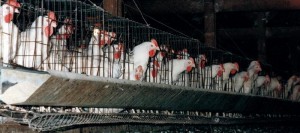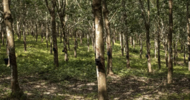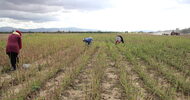Huffington Post | 4 May 2010
Mia MacDonald
Executive Director, Brighter Green Listening to members of the Senate subcommittee on investigations interrogate Goldman Sachs executives, I couldn't help but think, "chicken." And then, "where's the beef?" Not because the executives parried, ducked, and even drew out their syllables (much to Sen. Susan Collins's frustration) during their ten-hour grilling. But because the white shoe investment bank and securities firm has, in recent years, entered the messy world of global agribusiness. That's right: Goldman Sachs is in the business of factory farming. Perhaps I shouldn't have been surprised: in the late 18th century, the area around Wall Street housed slaughterhouses and tanneries. The word capitalism itself is rooted in the trade of (live)stock measured by head (Latin: capita) of cattle. Nonetheless, the parallels between the killings made on Wall Street then and now are not only eerie, but consequential. Just as the securitized debt deals Goldman was hawking may be, in Warren Buffett's words, "financial weapons of mass destruction," putting the whole economic system at risk of collapse, factory farming carries a parallel risk -- of environmental destruction and exploitation of resources, prospects for food security, and animals, all on a mass scale. Unfortunately, the Senate inquiry into Goldman's alleged malfeasance is unlikely to question why the company in 2008 decided to acquire ten intensive poultry farms in China's Hunan and Fujian provinces for $300 million. While Goldman isn't running the farms itself (that's outsourced) it retains control over the prices. "So for the record, that's: U.S. mortgages = bad . . . Asian livestock = good," is how the website Business Insider described the deal. This isn't the firm's first foray into this arena. Goldman is also principal owner of Burger King, joining Bain and Texas Pacific in 2002 in a $2.26 billion takeover of the fast food giant. Labor activists have criticized Goldman for the poverty wages earned by full-time Burger King workers, even as the firm continues to pay out billions in bonuses, including during the great recession. China Syndrome In China, Goldman may well be producing chicken for its own restaurants, since Burger King has 25 Chinese outlets. In recent decades, both fast food and U.S.-style factory farms that house thousands of animals in tiny cages or stalls in indoor sheds have become increasingly common in China. But such facilities, like the ones Goldman now owns, forfeit any semblance of animal welfare and have immense environmental and social costs. Why would Goldman want to own factory farms? Obviously, it sees an opportunity to make money, no matter the consequences. Meat consumption in China is rising rapidly; since 1980, it's quadrupled. Tyson, Smithfield, and other leading "protein producers" are active in the country, seeking new sources of profit by putting the proverbial chicken in 1.3 billion Chinese pots. Goldman must have wanted a piece of that pot, too. Goldman's poultry purchase could be labeled with the epithet Sen. Carl Levin used repeatedly at the hearings riffing on a Goldman employee's email description of one of the firm's securities schemes (a "shitty deal"). Filthy Lucre According to Wu Weixiang, an associate professor at China's Zhejiang University's Agriculture College, "Domestic animal and poultry waste has become a major source of environmental pollution." Indeed, China's billions of farmed animals produce an estimated 2.7 billion tons of manure a year--three-and-a-half times industrial solid waste levels--and runoff from livestock facilities has led to a significant "dead zone" in the South China Sea, akin to that in the Gulf of Mexico, which is also the result of agriculture. The poultry deal also contradicts a Goldman business principle. "Our responsibility for environmental stewardship does not fluctuate with changing economic conditions," the firm's 2008 Environmental Report states. "We hope our work continues to inspire action and creative market-based solutions that can help our environment endure and thrive. Only three percent of China's large and medium-sized livestock operations have facilities to treat animal wastes, according to Xu Cheng, a professor at China Agricultural University. Do Goldman's? Just a year and a half ago, Goldman was kept afloat by billions of dollars in U.S. government funds. Does that mean U.S. taxpayer dollars subsidized cruel, polluting, climate-heating factory farms in China? Even if the connection isn't direct, what are we to make of an elite private equity firm like Goldman helping expand industrial-scale animal facilities?Pumping up the Stock Factory faming and financial instruments of mass destruction aren't the only **itty deals. Intensive meat production requires vast amounts of grain to speed the animals' gaining weight -- ratcheting up output. Not long ago, China was a net exporter of soybeans, which, along with corn, is the main source of feed for farmed animals. Now, however, China is the world's largest soy importer, and its biggest supplier is Brazil. Much of "China's soy" is grown in what was Amazon forest, or on denuded savannah in Brazil's biodiverse Cerrado region. What's driving demand? Animals raised for meat and dairy, including chickens, in Chinese factory farms. Here, the effects of the ecological destruction are kept off the books by an intricate network of a different kind of trading than Goldman's allegedly dodgy dealings. The costs, however, are equally problematic--not least in food security and climate change. These aren't included on Goldman's balance sheet. Global agribusiness is searching for land on which to grow and export crops for people, and, increasingly a growing population of farmed animals. Their targets are poor countries in parts of Africa and Asia, where land may be cheap, but local hunger is often a dismaying reality. And even as human numbers grow, agricultural harvests will be affected as global warming accelerates. The most severe impacts will be in the poorest, most food-insecure regions. Industrial agriculture worsens the situation. According to the United Nations, the livestock sector is responsible for at least 18 percent of global greenhouse gas emissions. "Goldman Sachs believes that a healthy environment is necessary for the well-being of society, our people and our business, and is the foundation for a sustainable and strong economy," reads a section on the 'environment' section of the firm's website. Did Goldman run its investment in the Chinese poultry farms through an internal "green screen?" It certainly doesn't look like it. The global financial industry and agribusiness industries are both engaged in practices that threaten the oikos -- the ancient Greek word for "home" that forms the prefix for both economics and ecology. It's time to promote (and incentivize) investment in long-term sustainable yields rather than the making of a quick, but very costly, killing.














